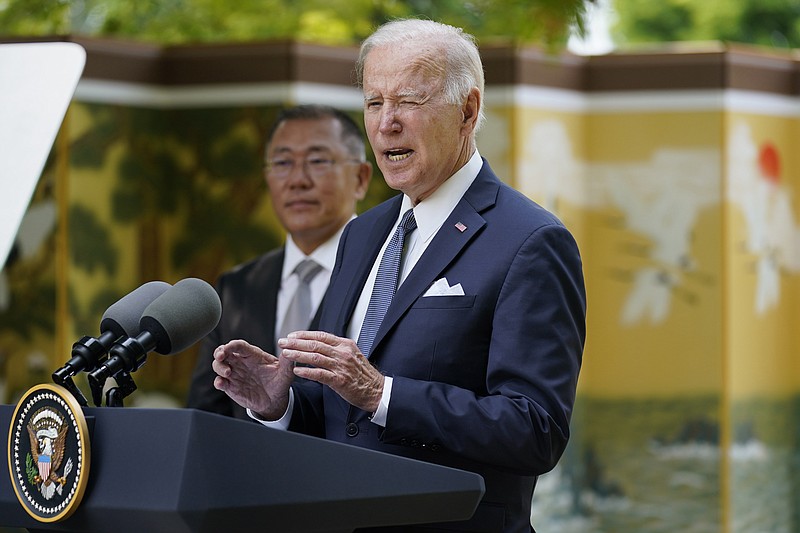SEOUL, South Korea -- President Joe Biden tended to business and security interests Sunday as he wrapped up a three-day trip to South Korea, first showcasing Hyundai's pledge to invest at least $10 billion in the United States and later mingling with troops at a nearby military base.
Biden's visit to Osan Air Base, where thousands of U.S. and South Korean service members monitor the evolving North Korean nuclear threat, was his final stop before he arrived in Tokyo later Sunday.
"You are the front line, right here in this room," the president said in a command center with maps of the Korean Peninsula projected across screens on a wall.
It was a day that brought together two key messages Biden is trying to project during his first trip to Asia as president.
Biden emphasized his global mission to strengthen the American economy by persuading foreign companies like Hyundai to launch new operations in the United States. And he wanted to demonstrate solidarity with nervous Asian allies who live in the shadow of North Korea's nuclear weapons.
Earlier Sunday, Biden brushed aside questions about any possible provocation by North Korea, such as testing a nuclear weapon or ballistic missile during his trip, saying, "We are prepared for anything North Korea does."
Asked if he had a message for the country's leader, Kim Jong Un, Biden offered a clipped response: "Hello. Period."
Biden's first appearance of the day was alongside Hyundai chairman Euisun Chung to highlight the company's expanded investment in the United States, including $5.5 billion for an electric vehicle and battery factory in Georgia.
"Electric vehicles are good for our climate goals, but they're also good for jobs," Biden said. "And they're good for business."
Chung also said his company would spend another $5 billion on artificial intelligence for autonomous vehicles and other technologies.
The major U.S. investment by a South Korean company was a reflection of how the countries are leveraging their long-standing military ties into a broader economic partnership.
Earlier in his trip, Biden toured a computer chip plant run by Samsung, the Korean electronics giant that plans to build a $17 billion production facility in Texas.
Biden has made greater economic cooperation with South Korea a priority, saying Saturday that "it will bring our two countries even closer together, cooperating even more closely than we already do, and help strengthen our supply chains, secure them against shocks and give our economies a competitive edge."
Biden passed on visiting the demilitarized zone on the North and South's border, a regular stop for U.S. presidents when visiting Seoul. Biden had visited the DMZ as vice president and was more interested in seeing Osan Air Base, said White House national security adviser Jake Sullivan.
Biden and Korean President Yoon Sook Yeol on Saturday announced they will consider expanded joint military exercises to deter the nuclear threat posed by North Korea.
The push toward deterrence by Biden and Yoon, who is less than two weeks into his presidency, marks a shift by the leaders from their predecessors. Former President Donald Trump had considered scrapping the exercises and expressed affection for North Korea's Kim. And the last South Korean president, Moon Jae-in, remained committed to dialogue with Kim to the end of his term despite being repeatedly rebuffed by the North.
Yoon campaigned on a promise to strengthen the U.S.-South Korea relationship. He reiterated at a dinner Saturday in Biden's honor that it was his goal to move the relationship "beyond security" issues with North Korea, which have long dominated the relationship.
"I will try and design a new future vision of our alliances with you, Mr. President," Yoon said.
During the Japan leg of Biden's trip, he planned to meet with Prime Minister Fumio Kishida today and lay out his vision for negotiating a new trade agreement, the Indo-Pacific Economic Framework.
Soon after arriving in Tokyo on Sunday evening, Biden stopped by the U.S. chief of mission's residence to take part in a room dedication for Norman Mineta, the late U.S. transportation secretary.
A central theme for the trip is to tighten U.S. alliances in the Pacific to counter China's influence in the region.
But within the administration, there's an ongoing debate about whether to lift some of the $360 billion in Trump-era tariffs on China. U.S. Treasury Secretary Janet Yellen recently said some of the tariffs are doing more harm to U.S. businesses and consumers than they are to China.
On Tuesday, Japan planned to host Biden at a summit for the Quad, a four-country strategic alliance that also includes Australia and India. The U.S. president is then set to return to Washington.
Information for this article was contributed by Chris Megerian and Darlene Superville of The Associated Press.
